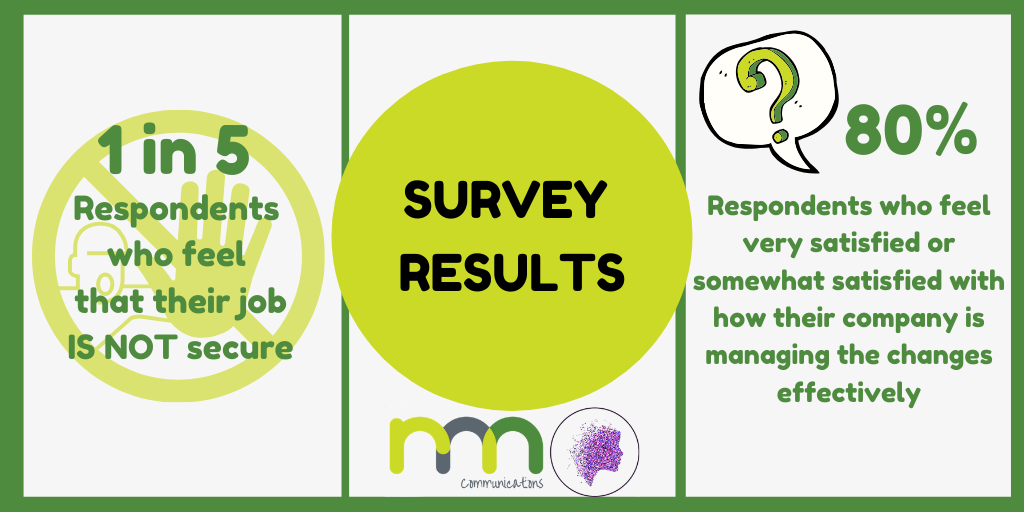

In a recent Communications and Covid-19 employee survey* carried out by our team at RNN Comms, and Women in PR NI, during the second half of May, it was discovered that the majority of Northern Ireland employers have been communicating well with their teams.
The survey - completed by 74% of respondents currently employed and working full time, 21% on furlough and 5% not employed - revealed that 80% were either very satisfied or somewhat satisfied with how their company is managing the changes resulting from Covid-19 effectively. However, in a sign of the times, the survey also revealed that 1 in 5 respondents do not feel that their job is secure.
*Almost 600 professionals completed the survey between the 18th May and 1st June.
Read the full story below our infographic:

83% of those who completed the survey claimed to have been kept well informed about the organisation’s response to Covid-19 and 77% agreed that they have been kept well informed about the impact of Covid-19 on the organisation.
Although a positive overall reflection on how NI organisations have communicated during this crisis, when asked how employers could have communicated more effectively, respondents’ comments included:
In contrast, one respondent commented: “My employer has done a great job of communicating changes and updates related to Covid-19. They have been very open and honest, and relevant information has been shared regularly with everyone.”
The survey revealed that 43% of respondents now have a more positive view of their leader based on their management of the Covid-19 crisis, however the responses showed that for 15% of people, they now view their leader / manager in a more negative light.
“A leader’s approach during a crisis is vital. Clear, authentic and frequent communications win every time, and this survey has demonstrated that the level of internal communications being delivered by organisations in NI has a direct correlation with how leaders will be viewed post this crisis,” adds Riki Neill, Director at RNN Communications.
Significantly, 78% of respondents said that they have access to support and advice from their organisation at this time, and even during this period of crisis, almost 1 in 2 (48%) said that their employers have been able to answer their questions in relation to Covid-19 and the workplace.
Riki continues: “Internal communications was often viewed as the poor relation in communications however this has been its time to shine. We’ve been delivering consultancy for organisations throughout this period and the lion’s share of our work has been in internal comms, when it has never been more valued.
“Organisations often talk of how the important element of their business is their people, therefore it’s heartening to see that so many NI businesses have really delivered for their employees, communicating the business’s position and plans regarding Covid-19. My hope is that this commitment to internal comms remains as it can deliver huge value for an organisation in terms of employee trust and is the backbone of an engaged and motivated workforce.”
With regards to company communications, formal letters may be a requirement for aspects of HR protocols, however letters were ranked as the least popular method of communication for employees. Email (44%) was the most popular with phone calls second highest (29%), closely followed by video conferencing (28%). WhatsApp divided opinion, with 19% of respondents agreeing that it worked well and 23% ranking it least favourable; similarly, social media was rated by 22% of people as their least favourable method of communications whilst 19% rated is highly.
Moving forward, the survey revealed an appetite for information from employers, with 64% of respondents preferring weekly communications from their employers regards Covid-19, 11% selecting fortnightly and 4% monthly.
Commenting on the survey’s findings, Michelle Canning, Co-Founder of Women in PR NI adds:
“In this, a global pandemic of unprecedented scale, it’s heartening to see that local employers, big and small, have invested in communicating with their staff.
“No one can control a crisis, but employers can control their communication with staff, who are one of the biggest determinants as to how fast and well any organisation recovers from any crisis.
“This survey has shown the importance of employee engagement. Meaningful engagement will ensure that trust remains at the centre of the relationship for the long term.”
As a direct response to the ever-changing landscape, RNN Communications has created ‘Purposeful PR’ - specific services that are relevant now in the era of purpose-driven communications. Featuring both internal and external solutions which are tailored to individual company’s requirements, RNN Comms is already delivering its Purposeful PR solutions to businesses in NI and ROI.